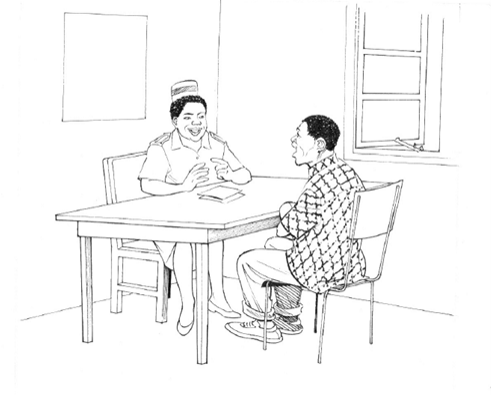Creating a good therapeutic relationship means communicating positively to ensure the patient is comfortable talking to you about their problems.
Communicaton Skills
exp date isn't null, but text field is
Positive attitudes and good communication skills are essential in order to assess and help a patient with a mental illness. Follow these tips:
- Be caring and friendly (listen carefully, be interested and understanding)
- Be respectful and accepting of the patient’s feelings and experiences
- Be genuine and sincere
- Be empathic (try to put yourself in the place of the person; ask yourself “How would I feel if I had these experiences?”)
- Be sensitive to the patient’s age, gender and culture
- Be self-aware (be aware of the way that the patient makes you feel). This is important for looking after your own wellbeing and can be a guide to how the patient is feeling
Unfortunately, many people, including some health workers, have negative feelings towards people with mental illness, for example:
- fear that the individual may attack them
- disapproval at the individual’s lack of hygiene
- frustration that the interview may take longer
- amusement at the odd behaviour shown
- anger towards the individual who they believe is wasting their time with ‘no real illness
These feelings can make it difficult for some people to help those with mental illness. The patient is also likely to be less comfortable and less likely to share information if he or she suspects their health worker has any negative feelings towards them. If you recognise these attitudes in yourself, remind yourself about how unhelpful they are and do your best to overcome them.
| A person with a mental illness should be treated with the same respect and compassion as anyone else. Ask yourself: if one of your family members became mentally ill, how would you hope for them to be treated? |
Although difficult in a busy clinic, try to find a quiet and private area in the clinic if possible, so the patient feels comfortable talking about things of a sensitive nature.

Show positive body language (SOLER):
- Sit facing the patient
- Open posture
- Lean forwards and towards the patient
- Establish eye contact
- Relax
- Greet the person (and any guardians) and introduce yourself.
- Ask if the patient would prefer to be interviewed alone so that they can feel free to say exactly what is happening without worrying what their guardian knows
- Use simple and clear language.
- Speak to the patient first. Ask the guardian later.
- Initially ask open questions (“how do you feel about him”, rather than “why did you hit him”) that allow the patient to explain his or her problems in their own words.
- You can then use closed questions to clarify specific information.
- Allow moments of silence if needed so the patient can have time to think or feel upset.
- Clarify your understanding by summarising what you have heard e.g. “So you started to feel low about a month after your baby was born, is that right?”
- Show empathy e.g. “It must have been very frightening when you heard those voices”.
- Explain why you are taking notes during the interview. If you are talking about very sensitive topics it may be better to stop making notes for a period so that the person knows that you are giving your full attention.
- Ask about the guardian’s experience of how the patient has been.